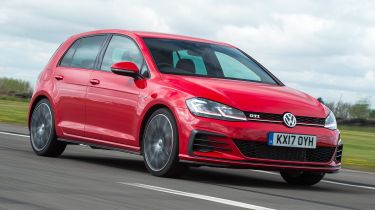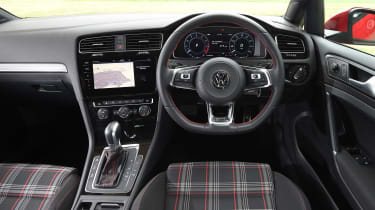Volkswagen Golf GTI (2012-2019) review - Engines, performance and drive
Superb chassis set-up makes the GTI both comfortable and agile. The engine is responsive and punchy too

With the optional adaptive dampers fitted, the VW Golf GTI is a very comfortable car on all but the roughest roads. These are standard on the TCR, but on the Performance model it’s an option we really recommend. In comfort mode the car glides along so serenely that you’d never guess it features lower, stiffer suspension, while Sport mode tightens things up nicely. Even without the upgrade, however, the Golf is still one of the better-riding hot hatchbacks out there.
It doesn't seem to compromise the handling either, as the GTI once again proves that it's a brilliant all-rounder. There are rivals, like the Honda Civic Type R, that offer more pin-sharp precision or wheel-scrabbling excitement, but they're more compromised in daily driving.
The Golf GTI also gets variable-ratio steering, which senses the amount of lock that is being applied to the wheel and adjusts the steering accordingly. It takes some getting used to but makes the car feel very agile, stable and responsive - giving the driver a lot of confidence to push on.
Naturally, the more expensive TCR edition ups the ante with lower suspension, drilled brakes and recalibrated steering. This, in addition to a sizeable power boost, pulls the GTI closer to the Golf’s razor-sharp rivals than ever. The TCR offers impressive handling and stopping power for a car of this type, but without many of the compromises associated with the harder hot hatches.
Used - available now

2019 Mercedes
GLC
56,500 milesAutomaticDiesel2.1L
Cash £18,000
2022 MG
HS
22,988 milesAutomaticPetrol1.5L
Cash £15,800
2019 BMW
1 Series
65,082 milesManualDiesel2.0L
Cash £9,800
2022 Nissan
Qashqai
15,071 milesAutomaticPetrol1.3L
Cash £16,900But the most important upgrade over older GTI models is the limited-slip differential. It’s a standard feature on both the Performance and TCR models, and allows the Golf to put its power down in tight bends much more cleanly, offering huge grip levels.
Engines
Before the introduction of more stringent WLTP emissions testing, the Golf GTI was available with a 227bhp 2.0-litre four-cylinder engine. While it was a little underpowered compared to rivals like the Honda Civic Type R and Ford Focus RS, it was still pokey, thanks to its healthy torque figure of 350Nm.
At the time, an optional ‘Performance’ edition could be specified which improved on these figures, raising power to 242bhp and torque to 370Nm. As a result, acceleration improved by a couple of tenths over the standard GTI, falling from 6.4 seconds to 6.2 seconds. Today, the Performance edition GTIs now occupy the lowest position in the range.
The TCR model, which went on sale in early 2019, has improved performance again, increasing power to 286bhp and torque to 380Nm, resulting in a 0-62mph sprint of to 5.6 seconds and a top speed of 155mph. If you opt to have the speed limiter removed, the TCR will top a whopping 162mph.
Performance edition Golf GTIs are available with either a six-speed manual, or a seven-speed DSG. Both are pretty slick, so it's a matter of personal preference which one to go for - though many prefer the extra engagement of changing gears yourself.
This is a serious issue for TCR-edition GTIs – supposedly billed as the hardest, fastest, driver’s choice – as they’re not available with a manual. Even though the DSG shifts quickly when you’re pressing on, it lacks the satisfaction of a well-timed heel-and-toe downshift that makes most of the latest hot hatches so engaging to drive.







